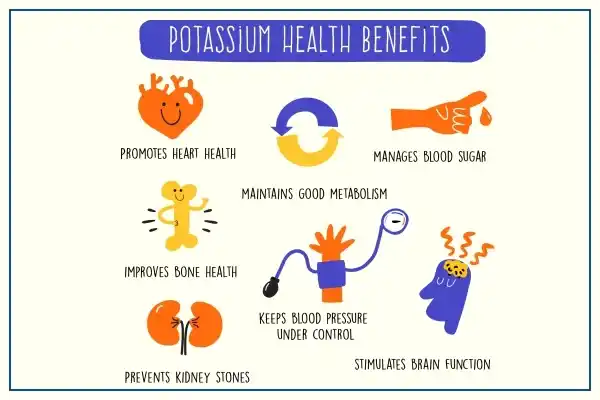- Cardiology 84
- Dermatology 45
- Endocrinology 33
- ENT 16
- Fertility 190
- Gastroenterology 78
- General-Medicine 81
- Gynecology 80
- Hematology 19
- Infectious-Diseases 33
- Neurology 52
- Oncology 34
- Ophthalmology 23
- Orthopedics 69
- Pediatrics 31
- Procedure 23
- Public-Health 144
- Pulmonology 59
- Radiology 8
- Urology 68
- Wellness 161
- Woman-and-child 77

What is Potassium?
Potassium is a vital mineral found in many foods you eat and serves as an electrolyte, conducting electrical impulses throughout your body. It plays a crucial role in various essential body functions, including:
- Blood Pressure Regulation : Potassium helps maintain healthy blood pressure levels.
- Water Balance : It ensures normal hydration levels within cells.
- Muscle Function : Essential for proper muscle contraction.
- Nerve Function : Facilitates nerve impulse transmission.
- Digestion : Supports digestive processes.
- Heart Health : Regulates heart rate and rhythm.
- pH Balance : Maintains acid-base balance in the body.
Your body does not naturally produce potassium, so it's essential to obtain it from potassium-rich foods and drinks. Adequate potassium intake is crucial to prevent deficiencies and enjoy its health benefits.
Secure your health with a second opinion. Make informed decisions and book your appointment today!
Get A Second OpinionRecommended Intake
For adults, daily potassium intake guidelines are:
- Men : 3,400 mg
- Women : 2,600 mg
Specific recommendations vary by age and gender:
| Age | Male | Female |
| 0–6 months | 400 mg/day | 400 mg/day |
| 7–12 months | 860 mg/day | 860 mg/day |
| 1–3 years | 2,000 mg/day | 2,000 mg/day |
| 4–8 years | 2,300 mg/day | 2,300 mg/day |
| 9–13 years | 2,500 mg/day | 2,300 mg/day |
| 14–18 years. | 3,000 mg/day | 3,000 mg/day |
| 19+ years | 3,400 mg/day | 3,400 mg/day |
During pregnancy and lactation, the recommended intake is 2,900 mg and 2,800 mg, respectively. Potassium should ideally come from a balanced diet supplemented under medical advice when necessary.
Ready to take control of your health journey? Book your appointment now and start your path towards wellness today!
Book an AppointmentBenefits of Potassium in Your Diet
- Muscle and Heart Health : Potassium supports proper muscle function and helps maintain a regular heartbeat.
- Nervous System : Facilitates nerve signaling, essential for brain function and learning.
- Kidney Function : Helps kidneys regulate fluid balance and remove waste.
- Metabolism : Supports energy metabolism and enzyme function.
Potassium Deficiency
Conditions like kidney disease, excessive diuretic use, and certain medications can cause potassium deficiency (hypokalemia). Symptoms range from mild muscle weakness to severe complications like irregular heartbeat. Diagnosis involves blood tests and monitoring pH levels.
Food Sources of Potassium
Many everyday foods are rich in potassium:
- Fruits : Bananas, oranges, melons, apricots, and dried fruits like prunes and raisins.
- Vegetables : Spinach, broccoli, potatoes, sweet potatoes, mushrooms, peas, cucumbers, zucchini, and green leafy vegetables.
- Juices : Orange, tomato, plum, apricot, and grapefruit.
- Dairy : Milk and yogurt (low-fat or fat-free).
- Fish : Tuna, halibut, cod, trout, and rockfish.
- Beans and Legumes : Lima beans, pinto beans, soybeans, and lentils.
- Other Sources : Salt substitutes, molasses, walnuts, meat, poultry, brown rice, whole wheat products.
Frequently Asked Questions
A low potassium level can cause muscles to feel weak, cramp, twitch, or even paralyze, and abnormal heart rhythms can develop.
There are several ways this mineral deficiency can cause weakness and fatigue. First, potassium helps regulate muscle contractions.
Drinking too much water can cause side effects that range from mildly irritating to life-threatening, and overhydration can lead to an electrolyte imbalance in the body, including potassium, sodium, and magnesium.
The attacks usually last between 24 and 48 hours. Potassium levels are usually abnormally low (hypokalemia).
Three to four cups of coffee a day is considered high in potassium and could raise your potassium levels.
Signs of low potassium include weakness, tiredness, muscle cramps, and irregular heartbeats.
Yes, potassium helps maintain fluid balance in your body, which is important for staying hydrated.
Most people need about 2,500 to 3,000 milligrams of potassium each day.

- Cardiology 2132
- Dermatology 168
- Endocrinology 135
- ENT 97
- Fertility 217
- Gastroenterology 232
- General 478
- General-Medicine 1685
- Gynecology 169
- Hematology 85
- Infectious-Diseases 208
- Neurology 207
- Oncology 345
- Ophthalmology 65
- Orthopedics 187
- Pediatrics 83
- Procedure 72
- Public-Health 209
- Pulmonology 126
- Radiology 13
- Second Opinion 311
- Urology 294
- Wellness 600
- Woman-and-child 447
- Others 10217
Related Blogs
If you have any questions, please fill out the enquiry form or call us, and we will get back to you promptly.
040-68334455